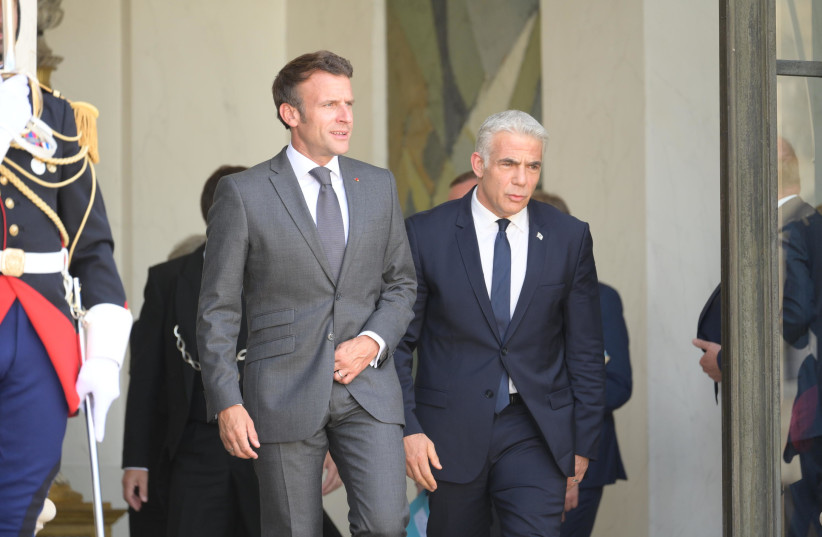PARIS – The French Jewish community is calling on authorities to explore all possible motivations behind the killing last week of 34-year-old Eyal Haddad, in the town of Longperrier, just northeast of Paris.
Haddad, originally from the Tunisian island of Djerba, also had Israeli citizenship. He was buried on Thursday at the Beersheba cemetery.
Yonatan Arfi, the new president of CRIF (the umbrella organization representing French Jewry) expressed his great concerns over the incident, telling The Jerusalem Post that French Jews are very much “on the front line” of the battle against antisemitism.
The French National Bureau of Vigilance against Antisemitism said Wednesday that Haddad’s neighbor, a Muslim man identified as Mohamed Dridi, confessed to killing him with an axe. He reportedly also attempted to burn and bury the body.
What the new president of the CRIF said about the attack

Although the investigation is still ongoing, French police for the moment have not determined if the crime was antisemitic.
“What’s important now is for the police to conduct a most serious and thorough investigation, to shed light on this incident,” Arfi stressed. “From what we see on social media, the profile of the killer is extremely troubling. We trust the authorities to inquire why Haddad was killed and will continue to follow this with great concern and apprehension.”
A representative of the CRIF assisted the burial ceremony of Haddad, he said, adding that the whole French Jewish community stands by the side of the family.
Arfi, 42, was elected president of CRIF in June, replacing Francis Kalifat. He has been active within Jewish institutions for more than 20 years.
“The watershed moment for me was when the Second Intifada broke out,” Arfi said. “A day after, we felt it here, in France, with a flux of antisemitic incidents. When I was young, I served as president of the French Jewish student organization. Since then, while working, I have never stopped engaging in the battle against antisemitism and in favor of our Jewish culture and heritage.”
ARFI EMPHASIZED that “France has become sort of a laboratory for what we call new antisemitism, the one based on anti-Zionism. We have seen that with the anti-vax movement, with the Yellow Vests movement, and of course within French Muslim groups. That is why our greatest mission now is to create and generate a dialogue with all parts of French society.”
Arfi welcomed the adoption by French President Emmanuel Macron and the National Assembly of the IHRA working definition of antisemitism.
“These were very important steps – and the fact that President Macron recognized anti-Zionism as a form of antisemitism,” Arfi said.
“But this is not enough, because it remains on the theoretical level,” the CRIF head said.
“In order to combat the new antisemitism phenomenon and bring the campaign to a practical level, we must work with teachers so that they integrate it in their debates with students, with police officers so that they recognize this as crime when it occurs, with civil society activists and so on. Only in this way can we generate social responsibility."
Yonatan Arfi
“We saw many teachers who voted in the last presidential elections for extreme Left candidate Jean-Luc Melenchon. But the teachers are not the problem – they are the solution,” he said.
“On the other hand, CRIF and I have no intention of generating any dialogue with extreme Right or extreme Left politicians. They are eager to talk to us, because such a dialogue would offer them a kosher certificate, so to say: it will whitewash them. We won’t lend a hand to that.”
THE CURRENT Macron government is certainly engaged in battling antisemitism, Arfi said. Nevertheless, he sees his role as pushing this engagement much further. With that, he commended French Interior Minister Gérald Darmanin on his determination to expel to Morocco Imam Hassan Iquioussen, considered close to the Muslim Brotherhood.
French authorities accuse Iquioussen of hate speech, targeting in particular the Jewish community. Last July, the Interior Ministry ordered his expulsion over what it called “especially virulent antisemitic speech” and sermons calling for women’s “submission” to men. The imam petitioned the decision early last month, getting a Paris judge to suspend his expulsion, but France’s top administrative court green-lighted it last week.
“We are relieved over this decision by the authorities to expel an imam who spread homophobia, sexism and racism. It is a good thing that France takes measures to defend itself,” Arfi told the Post.
Eight months before the election of Arfi to his position, 51-years-old Elie Korchia was elected head of the Consistoire, which unites all French Jewish communities and religious institutions. Together, they represent the new generation of the local Jewish leadership.
“Of course, this was a major reason why I was elected to the job. To rejuvenate our community leadership – to persuade young people to engage and invest not just in the closer Jewish circles of family and friends, but also in the wider community circles,” he said.
“My message to our young members is to reject defeatism,” Arfi said. “We cannot give up on our battle against the dangerous phenomena of antisemitism and anti-Zionism. This is a role we all must play, not just for the sake of French Jews, but for the sake of French society.”
